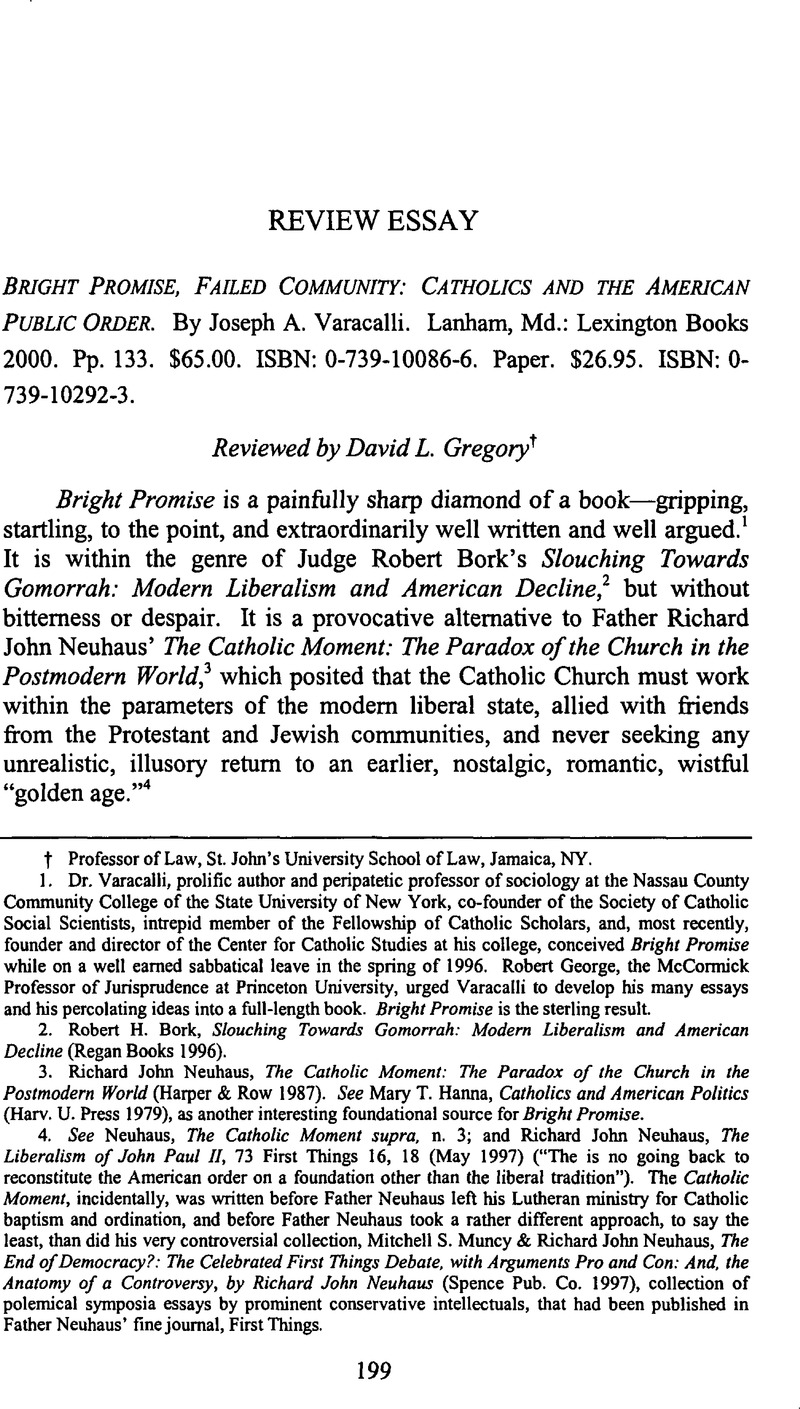No CrossRef data available.
Article contents
Bright Promise, Failed Community: Catholics and the American Public Order. By Varacalli Joseph A.. Lanham, Md.: Lexington Books2000. Pp. 133. $65.00. ISBN: 0-739-10086-6. Paper. $26.95. ISBN: 0-739-10292-3.
Published online by Cambridge University Press: 24 April 2015
Abstract

- Type
- Article and Review Essay
- Information
- Copyright
- Copyright © Center for the Study of Law and Religion at Emory University 2003
References
1. Dr. Varacalli, prolific author and peripatetic professor of sociology at the Nassau County Community College of the State University of New York, co-founder of the Society of Catholic Social Scientists, intrepid member of the Fellowship of Catholic Scholars, and, most recently, founder and director of the Center for Catholic Studies at his college, conceived Bright Promise while on a well earned sabbatical leave in the spring of 1996. Robert George, the McCormick Professor of Jurisprudence at Princeton University, urged Varacalli to develop his many essays and his percolating ideas into a full-length book. Bright Promise is the sterling result.
2. Bork, Robert H., Slouching Towards Gomorrah: Modern Liberalism and American Decline (Regan Books 1996)Google Scholar.
3. Neuhaus, Richard John, The Catholic Moment: The Paradox of the Church in the Postmodern World (Harper & Row 1987)Google Scholar. See Hanna, Mary T., Catholics and American Politics (Harv. U. Press 1979)CrossRefGoogle Scholar, as another interesting foundational source for Bright Promise.
4. See Neuhaus, The Catholic Moment supra, n. 3; and Neuhaus, Richard John, The Liberalism of John Paul II, 73 First Things 16, 18 (05 1997)Google Scholar (“The is no going back to reconstitute the American order on a foundation other than the liberal tradition”). The Catholic Moment, incidentally, was written before Father Neuhaus left his Lutheran ministry for Catholic baptism and ordination, and before Father Neuhaus took a rather different approach, to say the least, than did his very controversial collection, Muncy, Mitchell S. & Neuhaus, Richard John, The End of Democracy?: The Celebrated First Things Debate, with Arguments Pro and Con: And, the Anatomy of a Controversy, by Richard John Neuhaus (Spence Pub. Co. 1997)Google Scholar, collection of polemical symposia essays by prominent conservative intellectuals, that had been published in Father Neuhaus' fine journal, First Things.
5. See for example Herberg, Will, Protestant, Catholic, Jew: An Essay in American Religious Sociology 75–80 (Anchor Books 1960)Google Scholar (former Marxist and later Orthodox Jew posited that the umbrella reality in religious life in America after World War II was that the three great religious traditions of Judaism, Protestantism, and Catholicism were blending into a pervasive secular, civil religion—“the American Way.”). See Rev.Murray, John Courtney, S.J., , We Hold These Truths; Catholic Reflections on the American Proposition (Sheed & Ward 1960)Google Scholar (natural law truths were implicit in the Declaration of Independence, and good Catholics should strive to be good American citizens, fully participating in public and civic life).
6. Economic Justice for All: Pastoral Letter on Catholic Social Teaching and the U.S. Economy (U.S. Catholic Conf. & Natl. Conf. Catholic Bishops 1986).
7. The Challenge of Peace: God's Promise and Our Response: A Pastoral Letter on War and Peace (Office Pub. Services, U.S. Catholic Conf. May 3, 1983)
8. PopePaul, John II, Ex Corde Ecclesiae (Cardinal Newman Socy. 1990)Google Scholar.
9. Johnson, Paul, Pope John Paul II and the Catholic Restoration (1st ed., St. Martin's Press 1981)Google Scholar.
10. The Pope [Paul VI], who later spoke of the “anguish” the document [Humanae Vitae encyclical] had caused him, wrote, “It can be foreseen that this teaching will perhaps not be easily received by all.” Schaffer, Martin D., Consequences of Birth Control Ban Still Reverberating, Toronto Star M11 (08 13, 1988)Google Scholar.




